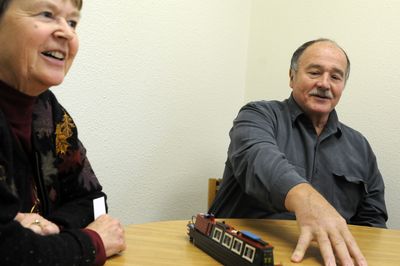Overseas forensics
Rathdrum couple share experience in England at free presentation

When Chet and Diane Park flew out of London’s Heathrow Airport five years ago, they had a lot on their minds. He was contemplating taking a temporary job in England; she was wondering what that would be like, and what to do with her successful pond-scaping business in the meantime. And what were they to do with the family farm they live on, just north of Rathdrum?
As the plane gained altitude, Diane Park looked out the window and saw the long narrow boats that floated on the canals below.
“She looked at me and said ‘If you take that job, we’re living on one of those boats,’ ” Chet Park said. “I just kind of shrugged it off.” About a year later it became reality.
On Tuesday, Chet Park will give a presentation at the Lake City Senior Center about the work he did as a forensic firearms expert in England from 2003 to 2007, where he helped establish a private forensic laboratory that was to aide domestic, international and military law enforcement agencies investigate all sorts of firearms-related incidents.
“Moving over there we didn’t know what to expect,” Diane Park said, sitting in a small meeting room at the Rathdrum Library. “We brought a tent trailer and a canoe. We lived in the camper for six or eight weeks, while we got everything figured out.”
The staffing at Forensic Alliance sounded like the beginning of a good joke, Chet Park said, because it consisted of one Irish, one Scotsman and one American.
“It was a great group,” Chet Park said.
Diane Park was hired as an evidence submission officer.
“They are big on DNA so we had to wear scrubs,” Diane Park said. “I’d say their attitude toward work is a little more laidback than ours. They work a 371/2 hour work week, and they come and go exactly on time – we were the ones who opened and closed.”
Chet Park already had extensive experience with forensic firearms investigations, among other jobs working for the Idaho State Patrol crime lab in Coeur d’Alene.
The biggest adjustment for him was that laws and regulations pertaining to firearms are completely different in England.
“I would say they have arguably some of the most stringent gun control laws in the world,” Chet Park said. “And most police officers are not armed, unless they belong to a specific firearms unit.”
Because firearms are regulated, finding gunpowder residue on a person’s clothing is a lot more unusual in a criminal investigation in England than it is here.
“It’s not like here where every truck has a gun rack in it and you could have picked up the residue in a number of different places,” Chet Park said.
One case Park worked on was that of the first British soldier killed in Iraq. He was killed by friendly fire at a time where the issuance of body armor to British soldiers was a very controversial issue.
“We worked closely with the military police on that case, trying to establish exactly what had happened,” Park said. “We also got called out to crime scenes off the island of Jamaica, in Afghanistan and Iraq.” These real cases are the focus of Park’s presentation next week.
Once the Parks had navigated the labyrinth new immigrants go through in any country – getting a bank account, finding a place to live, getting to know some local people – they embraced British culture.
“The first month was hard, I spent it mostly in tears,” Diane Park said. “I missed my family. And we felt like teenagers without any credit: We were starting from scratch – suddenly you are shopping for a broom and dust pan again.”
They found a pub, The Wheat Sheaf, and were adopted by a group of people who came there for “Quiz Night.”
“We were sitting at their table one night, and they just sort of moved in on us,” said Chet Park. “After that first night, we were part of Ruby’s Gang.”
Surrounded by canals – the Parks lived just north of Leeds – Diane Park didn’t forget about the boat she’d seen from the air.
“We took a helmsman’s course so we’d know how to sail it,” Diane Park said. “We’d been there for about nine months when we bought the boat.”
Their boat was a traditional long and narrow river boat, a “Narrow Boat”– which can best be described as a barge. Only 71/2 feet wide by 50 feet long, these boats are built specifically for the shallow and narrow canals that crisscross much of England.
“You can go pretty much anywhere in England on the canals,” Chet Park said. “It’s just a great way to travel.” At a top speed of 4 miles per hour, navigating the canals includes going through an endless row of locks and gates.
“One day we went through 27 locks,” Chet Park said. “There are always lots of people there who will help you open and close the locks and the gates. It’s just a great way to travel and meet people.”